|
Chapter 20 (part B) (p.283)
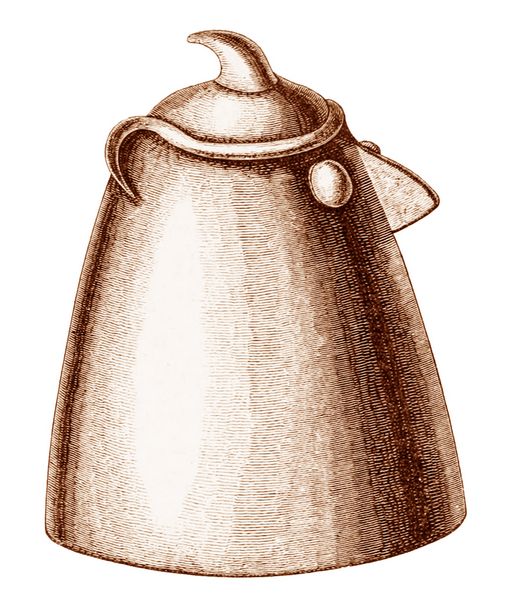 The
most interesting of the terra-cottas found this week, and the most
important to archæology, are these:—the beautiful red vase-cover with
the owl’s face and helmet of the Ilian Athena, which was found in a
large red urn at a depth of 8 meters (27 feet):—then two vases,
likewise adorned with the owl’s head of the tutelary goddess of Troy,
but also with two breasts, a large navel, and two upraised arms. One of
these vases was found upon the Tower, the other above it, at a depth of
4 meters (13 feet).
Fig.195: Profile of a Vase-cover,
with the Owl’s Face and Helmet of Athena, in brilliant red Terra-cotta.
Found in an urn on the Tower (8m depth).
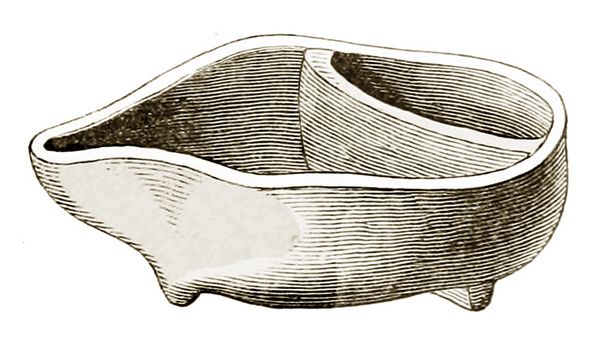
Fig.196: An Earthenware Crucible on four feet, still containing some copper. Found on the Tower (7m depth).
Among
the other very remarkable terra-cottas found in one of the rooms of the
subterraneanhouse, at a depth of 7 meters (23 feet), there is a
crucible with four feet, in which some copper is still to be seen; also
a small brilliant black funnel. I also (p.284) found in the house, at the
depth of 7 and 8 meters (23 to 26 feet), several idols of ordinary
stone or of marble; one also of bone, upon which are seen the two arms
of the goddess; it is only upon one of the marble idols, and upon one
of those of stone, that I find the two eyes. This week we met with only
one idol of ordinary stone with a rude engraving of the owl’s face; it
was discovered at a depth of 4 meters (13 feet). I must remark that the
idols of common stone are always very roughly made.
Of the small
terra-cotta whorls, both with and without symbolical engravings, we
this week again met with 251 pieces; of these, however, only 31 had
symbolical figures which I have not yet found. Several of the engraved
decorations on these articles have been executed with a fineness which
is truly astonishing, and more especially those which are engraved upon
brilliantly black wheel-shaped pieces: they are so fine that I could
only distinguish them through a magnifying glass.
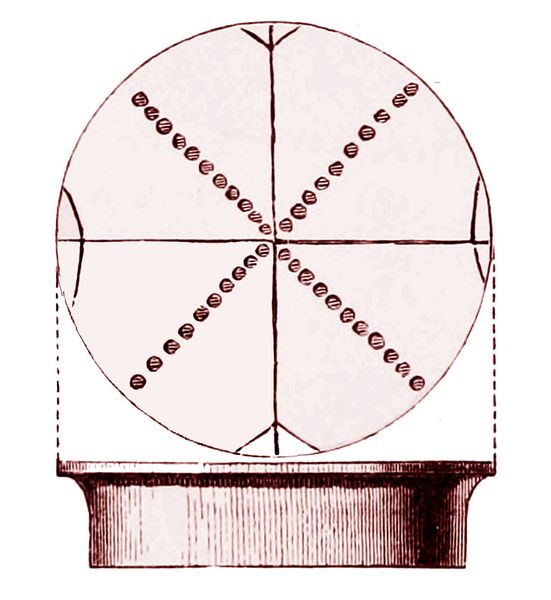 At
a depth of 6 and 8 meters (20 to 26 feet) we again met with very many
ordinary plates, which had been turned on a potter’s wheel. At the same
depth, and in the above-mentioned house, we found a curious vessel,
exactly in the shape of a saucer to a flower-pot, ornamented with four
triangles and two large crosses, one of which is formed by large dots,
the other by lines.
Fig.197: Flower Saucer; the flat bottom ornamented. Found on the Tower (8m depth).
Several curious moulds were also found this week,
one of which is of coarse terra-cotta for casting eight copper bars;
the other moulds are made of mica-schist, and one was for casting an
object in the form of a leaf with three long thorns on either side; the
other mould shows three uniform furrows for casting oblong rings. This
week we found only fragments of stone (p.285) moulds for casting weapons
and instruments. At a depth of from 10 to 26 feet we also discovered 27
small silex knives like saws, and six very pretty knife-blades made of
black obsidian, which are sharp enough to serve as razors. We have
found no copper knives this week, but, on the other hand, four copper
dress or hair pins, from 2-1/3 to above 5 inches long; also thirteen
needles for knitting or embroidering; likewise sixteen large bodkins
made of staghorn, and a number of pointed boars’ tusks. Among the stone
implements found during the week, there are two very pretty hammers of
diorite and a very neat perforated prop of mica-schist with a small
furrow at the top, for turning a spit, and other such things. (See No.
177, p. 261.)
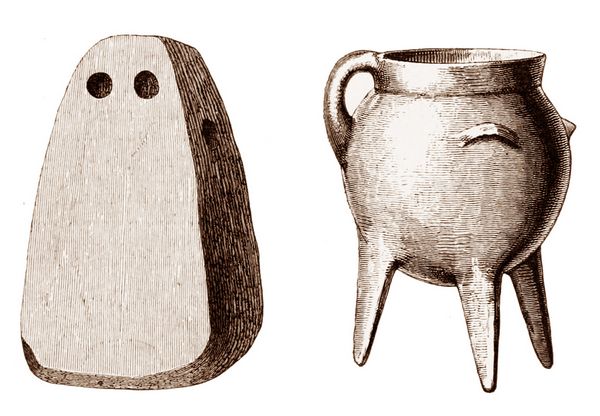
Fig.198: A piece of Terra-cotta, with two holes
slightly sunk in front like eyes, and a hole perforated from side to
side (8m depth).
Fig.199: A remarkable Terra-cotta Vessel on three long feet, with a handle and two small ears (7m depth).
In
returning to the terra-cottas I must mention a square article, the
upper part of which gradually becomes narrower and thinner: on the
front side there are two small depressions in the form of eyes, and on
one side it is perforated. I add a drawing of this curious article, the
use of which is quite unknown to me. I may mention further a curious
pot found in the house, at a depth of 7 meters (23 feet), (p.286) with
three feet, two small ears, and one handle; also those neat cups with
one handle and three feet, which are repeatedly met with in the same
house. At a depth of 3 meters (10 feet) we discovered a bright red
polished little box, from the under side of which two small perforated
rings project.
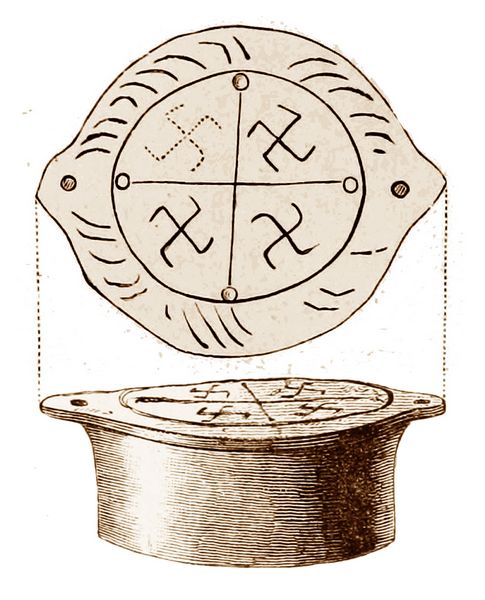 The pattern on the bottom represents the sun with its
rays; in the centre of the sun’s disc is a cross, which ends in four
small circles, and these are probably intended to represent the heads
of the nails which fastened the two crossed staves employed to produce
the holy fire. In every one of the four spaces formed by the cross
there is a ?, one of which is represented by dots.
Fig.200: A beautiful bright-red Terra-cotta Box (or Vase-cover?), decorated with a [+ four ?, and a halo of solar rays (3m depth).
We
also again met with one of those small perforated terra-cottas,
consisting of two connected balls, and which somewhat resemble our
shirt-studs; the upper part of the article in question shows three
simple rising suns and six stars; the lower part represents three
triple rising suns, and three stars in the circle round the central
point.
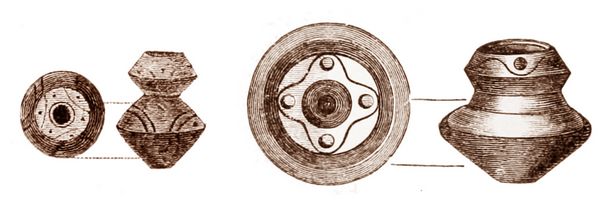 During the week we have met with only one terra-cotta
ball; it shows an encircling jagged streak and five small streaks,
which may denote suns or moons.
Figs 201,202: Little Decorated Whorls, of a remarkable shape (6m depth). (p.287)
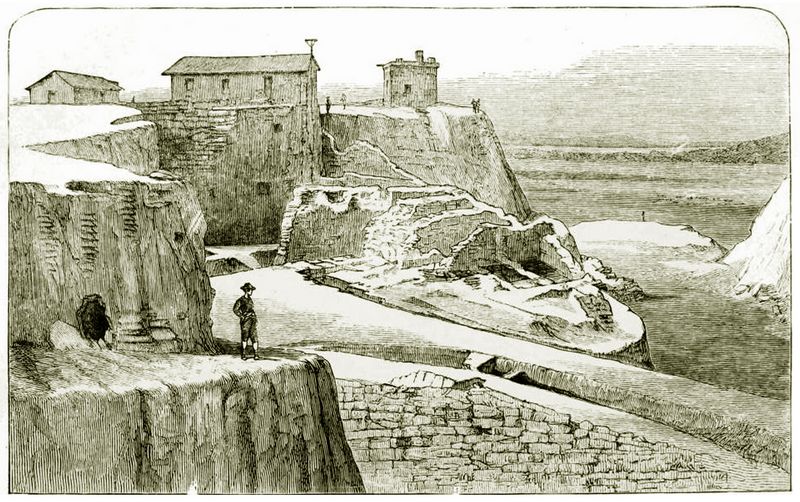
Plate X: Dr.
Schliemann’s Houses and Magazine. Plain of Troy and Hellespont. Tower
of Ilium Scaean Gate, and Palace of Priam. Looking North along the cutting through the whole Hill.
.
Footnotes:
[149]
Some
[Continue to Chapter 21]
[Return to Table of Contents]
|
|